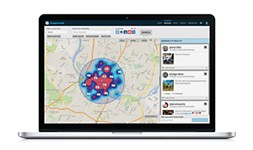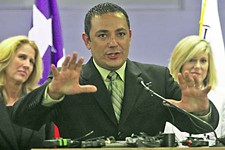City Hall Hustle: Confusion Center
Oh, the devil's in the details of collecting regional intelligence
By Wells Dunbar, Fri., May 21, 2010
As proposed, the data-crunching clearinghouse is supposed to be less intrusive than some of its siblings around the country. Fusion failures elsewhere include the North Central Texas Fusion System, which singled out for scrutiny anti-war protesters and Muslim civil rights orgs, and the Missouri Information Analysis Center, which pointed to Ron Paul bumper stickers and beliefs in the discredited NAFTA "superhighway" conspiracy theory as signs of potential trouble. (Uninformed? Decidedly. Dangerous? Probably not.) By contrast, ARIC proponents, including Austin Police Department Chief Art Acevedo, have repeatedly claimed there must be a "criminal predicate" for information to appear in our center: arrests and incident reports, with no private data-mining of purchases, travel, and the like. But while that's all well and good, a discrepancy between an interlocal agreement among fusion center agencies and a policy to prevent privacy abuses has some wondering whether the ARIC's promises are worth the paper they're printed on.
At issue is that interlocal agreement between the APD – which bears "primary responsibility" for operating the ARIC – and just about every other regional police force, including Georgetown, Pflugerville, Round Rock, and San Marcos, the Hays, Travis, and Williamson county sheriffs' offices, plus the Austin ISD and UT police departments. The agreement, which broadly outlines core missions and administrative and personnel policies for the center, is tentatively scheduled for City Council approval on May 27. But with the privacy policy stripped out of that agreement, some are now calling to delay executing the agreement until the center's privacy policies are firmly in place.
The agreement was initially vetted by the Public Safety Commission. At a contentious May 3 meeting, the agreement was approved (to shouts of "Shame!" from opposed onlookers), with commissioner Ramey Ko the sole nay vote. But since the vote, the KeyPoint-Nathaniel Sanders II imbroglio broke (see "'Reckless Tactics' ... and the Blowback," May 14), and Ko said "many of the same people" who supported keeping KeyPoint's findings secret "are now among those urging the council to push forward on the fusion center proposal. Even though critical components of the interlocal agreement and privacy policy, such as independent auditing and the makeup and operation of the Privacy Policy Oversight Committee, are still far from complete," Ko continued, "they are asking the council and the people of Austin to simply trust them, and supposedly everything will be worked out later."
For Ko, the agreement's been a moving target. Initially, his understanding was that "the interlocal was going to be a shell, and the privacy policy would fill it in," incorporated into the agreement once approved. But in the newest version of the agreement (posted on council's May 27 draft agenda), "the privacy policy is no longer incorporated into the interlocal," he says. "It looks like the idea is they're trying to make it legally possible for council to pass the interlocal without the privacy policy as an official part of it, and that will just get adopted later." The problem with that, Ko says, is that since the privacy policy was predicated on incorporation into the interlocal agreement, the agreement now "has huge gaps, because from the beginning, the conceptual approach was not to put all the substantial issues" in the deal. While the agreement provides for creation of a privacy committee and allows for external audits, Ko notes there's no explanation of the committee's authority, composition, or schedule, and nothing either about audit procedure – even the question of whether City Council is the body that will ultimately approve the privacy policy is unresolved. "We're urging the council members to consider asking for a delay," Ko says, "until it can be worked out exactly what is the relationship between these documents, and until the point they can both be considered together, because it's very confusing to try to read the two separately."
This week, Ko met with the offices of several council members, including Randi Shade. While she has her own questions, Shade says, "I think probably what's going on is, given the fact we've only got three council meetings in the summer, these things [the interlocal agreement and the privacy policy] are all working on parallel tracks. They're still shooting for an August opening." Her concerns are somewhat assuaged by a statement in the agreement: "The Privacy Policy, as accepted by the Department of Homeland Security, shall be adopted by the Executive Board prior to the Center becoming operational." But with so many unanswered questions – some begging for a legal analysis – should council still approve the agreement as is?
Ko "would probably say it's 50% done, and others would say it's 90% done," Shade says. "In any case, it's not done yet."
Council's meeting this week is canceled; it next convenes on May 27. For more council copy, visit the Daily Hustle at austinchronicle.com/tdh.
Got something to say on the subject? Send a letter to the editor.










